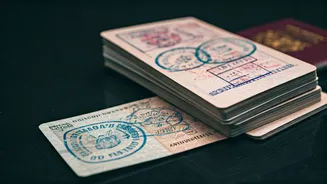Initial ED Actions
The Enforcement Directorate (ED) recently launched raids in West Bengal as part of its investigation into a sophisticated fake passport racket. The primary
focus of these raids was to gather evidence related to the issuance of fraudulent passports. These passports were allegedly being created and distributed by individuals involved in criminal activities. The investigation was triggered by intelligence reports. Officials were aiming to disrupt the illegal operations and apprehend those responsible. The ED's actions involve detailed scrutiny of financial transactions, suspected properties, and the seizure of relevant documents and electronic devices. The investigation is still ongoing. The ED's goal is to fully understand the scope of the racket, including the number of passports issued and the individuals who benefited from them. By taking such actions, they are trying to dismantle the entire criminal network and bring the culprits to justice. The raids signify a significant step toward curbing illegal activities and ensuring the integrity of the passport system.
Pakistani Citizen Connection
The ongoing investigation into the fake passport racket in West Bengal has revealed links to a Pakistani citizen. This connection has raised serious concerns about the potential involvement of foreign elements and the implications for national security. The ED is carefully examining the nature and extent of this connection to determine whether there were any collaborations between the suspects in West Bengal and the Pakistani citizen. This involves a thorough analysis of communication records, financial transactions, and any other evidence that might shed light on the relationship. The investigation also focuses on whether the passports were used to facilitate illegal activities such as human trafficking, terrorism, or other forms of criminal enterprise. The involvement of a foreign national adds another layer of complexity to the investigation. The ED is working in coordination with other law enforcement agencies to uncover the entire truth behind this intricate network and make sure those guilty are caught.
Scope of the Racket
The fake passport racket in West Bengal appears to be extensive, with the ED working to determine the full scope of the operation. This encompasses identifying the number of fraudulent passports that were created and disseminated, as well as locating all individuals and groups connected to this criminal enterprise. Investigations include analyzing financial records, tracking communication patterns, and scrutinizing travel histories. Authorities are trying to pinpoint where the passports were created, how they were distributed, and the identities of those who benefited from them. The investigation involves multiple locations throughout West Bengal. Officials are meticulously gathering evidence and information from various sources to build a comprehensive understanding of the racket's magnitude and reach. The ED is dedicated to pursuing the case thoroughly, and identifying all individuals involved, including the masterminds and the beneficiaries of this illegal scheme. By uncovering the racket's full scope, law enforcement hopes to dismantle the criminal network and prevent similar activities from happening in the future.
ED's Investigative Tactics
The Enforcement Directorate (ED) is employing sophisticated investigative tactics to probe the fake passport racket in West Bengal. These methods are designed to uncover financial transactions and communication patterns, and gather information to build a strong case. The ED is utilizing digital forensics to analyze electronic devices like mobile phones, laptops, and hard drives for clues and evidence. This will help to identify the key players involved, and track the flow of funds and other relevant data. Investigators are carefully examining financial records to detect any irregularities, such as suspicious transactions, money laundering, and the movement of funds related to the passport racket. They are also conducting interviews and interrogations of suspects, witnesses, and other individuals who could provide important insights into the case. Coordinating with other law enforcement agencies allows the ED to access and share data, to provide a holistic view. These investigative methods help to thoroughly investigate the criminal network, and bring those guilty to justice.
Legal and Security Implications
The fake passport racket in West Bengal has significant legal and security implications. The fraudulent issuance of passports poses a severe threat to national security, as it allows individuals to bypass the proper verification processes and potentially engage in illegal activities. Those involved in creating and distributing fake passports can face severe legal consequences, including criminal charges, lengthy prison sentences, and financial penalties. The ED is working to prosecute those involved. Besides the legal implications, the fake passport racket also puts the country at risk by enabling human trafficking, facilitating organized crime, and potentially providing cover for terrorists. The integrity of the passport system is crucial for national security. The authorities are working to tighten passport issuance procedures, enhance verification processes, and increase vigilance to prevent similar incidents. By addressing the security threats, the authorities aim to protect the country from illegal activities and maintain public safety.












